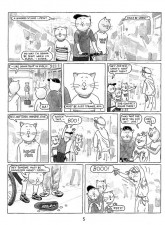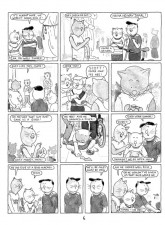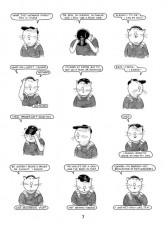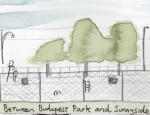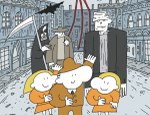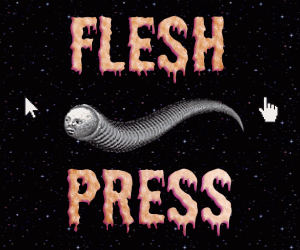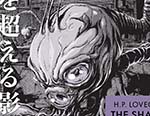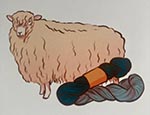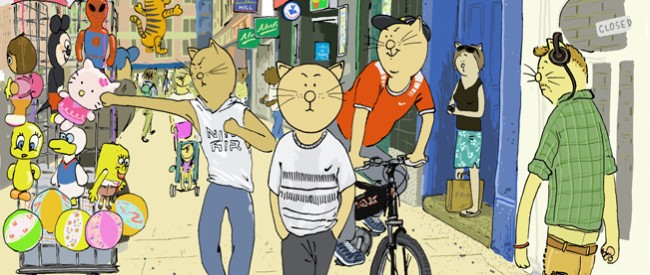 Playing Out combines Medway’s lively cartooning comedy with an incisive eye for slice-of-life observational analysis.
Playing Out combines Medway’s lively cartooning comedy with an incisive eye for slice-of-life observational analysis.
It’s most appropriate to be reviewing Jim Medway’s Playing Out at this time of year when we are reaching the tail-end of summer and the “Back to school” displays are dominating storefront windows. Medway’s character study of amiable, idle youth follows brothers Kieran and Connor, and their friend Jamal, on one of those final days of the vacation before a new term begins. All three of the lads are on the cusp of great changes in their lives. Kieran and Jamal are in that awkward intermediate time between childhood and the peripheries of adulthood while the younger Connor has reached that formative and awe-inspiring rite of passage of moving up to secondary school (or “big school” as he calls it).
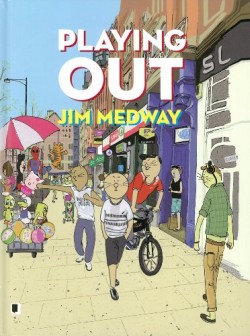 Through 40-odd pages we follow the boys as they do all those wonderfully pointless, futile, timewasting things that anyone of their age with hours to fill and no money to spend would do in the circumstances. They hang aimlessly around shopping centres, climb to the top of car parks, play pranks on public transport, and chat self-consciously with girls. It’s a strip told from their juvenile outlook; the grown-up world seen through the lens of naive youth. Spotting a teacher with his family and realising he has a hitherto unimagined personal life becomes a major revelation, for example, and security guards just doing their jobs become a symbol of mean-spirited oppression.
Through 40-odd pages we follow the boys as they do all those wonderfully pointless, futile, timewasting things that anyone of their age with hours to fill and no money to spend would do in the circumstances. They hang aimlessly around shopping centres, climb to the top of car parks, play pranks on public transport, and chat self-consciously with girls. It’s a strip told from their juvenile outlook; the grown-up world seen through the lens of naive youth. Spotting a teacher with his family and realising he has a hitherto unimagined personal life becomes a major revelation, for example, and security guards just doing their jobs become a symbol of mean-spirited oppression.
What’s so beautifully played here is that, to all extents and purposes, virtually nothing actually happens. There’s no intricately constructed plot to Playing Out but it’s a rich character piece nonetheless because this is a book where a simple conversation, or the briefest of interactions with a supporting player, tells us more about a protagonist than umpteen convoluted subplots ever could. Medway knows how to make his audience feel fully invested in these likeable young chaps; we empathise with them because, quite frankly, we have been them. And it’s that level of reader identification that is Playing Out’s greatest strength.
What makes this such an evocative piece of storytelling, then, is that you are as much a stakeholder in the narrative as a reader of it. You have lived these events, or something very similar to them. Who won’t recognise those long, hazy days of childhood summer holidays when the weeks stretched on forever, worries were few, and having nothing to do became almost a vocation? Medway also has a perceptive understanding of teen banter, the matey in-jokes, and the structural complexities of the social order at that impressionable age. Dialogue between the three main players is flowing, natural and a keen reflection of the verbal back and forth of kids whose propensity for teasing each other mercilessly is only outstripped by their fierce loyalty to one another.
The book is punctuated throughout by the cast giving us one-page monologues that act as insights into their characters, personality tics and relationships with each other. These interludes underline one of Medway’s great visual storytelling assets. Not only can he capture the vocal inflections of teen chitchat but just watch the body language of his cast throughout. It’s beautifully captured, adding a whole other level of authenticity to the proceedings. The use of anthropomorphic cats is also inspired; as with all the best practitioners of anthropomorphism on the comics page, Medway ensures this artistic technique adds that somewhat ironic extra layer of humanity to his main players.
Before this I was only familiar with Jim Medway’s work from the UK kids weeklies The DFC and The Phoenix. Playing Out combines that lively cartooning comedy with an incisive eye for slice-of-life observational analysis. Another winner for Blank Slate Books.
Jim Medway (W/A) • Blank Slate Books, £8.99/$11.99, August 3rd, 2013





